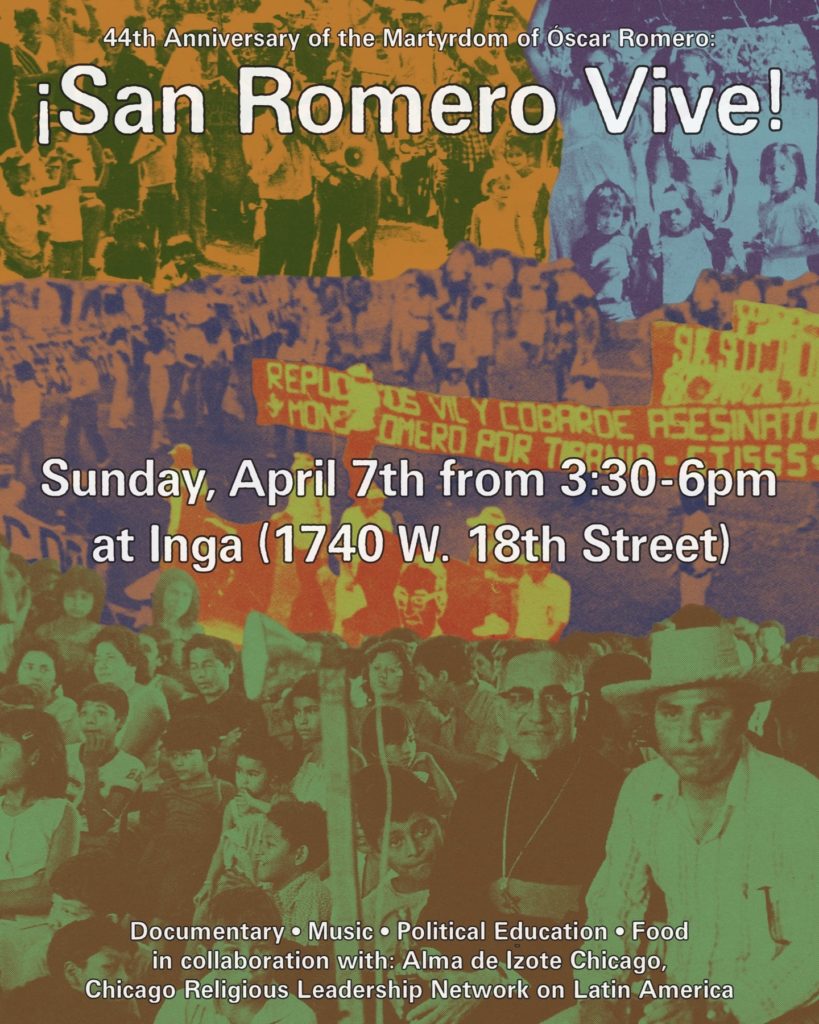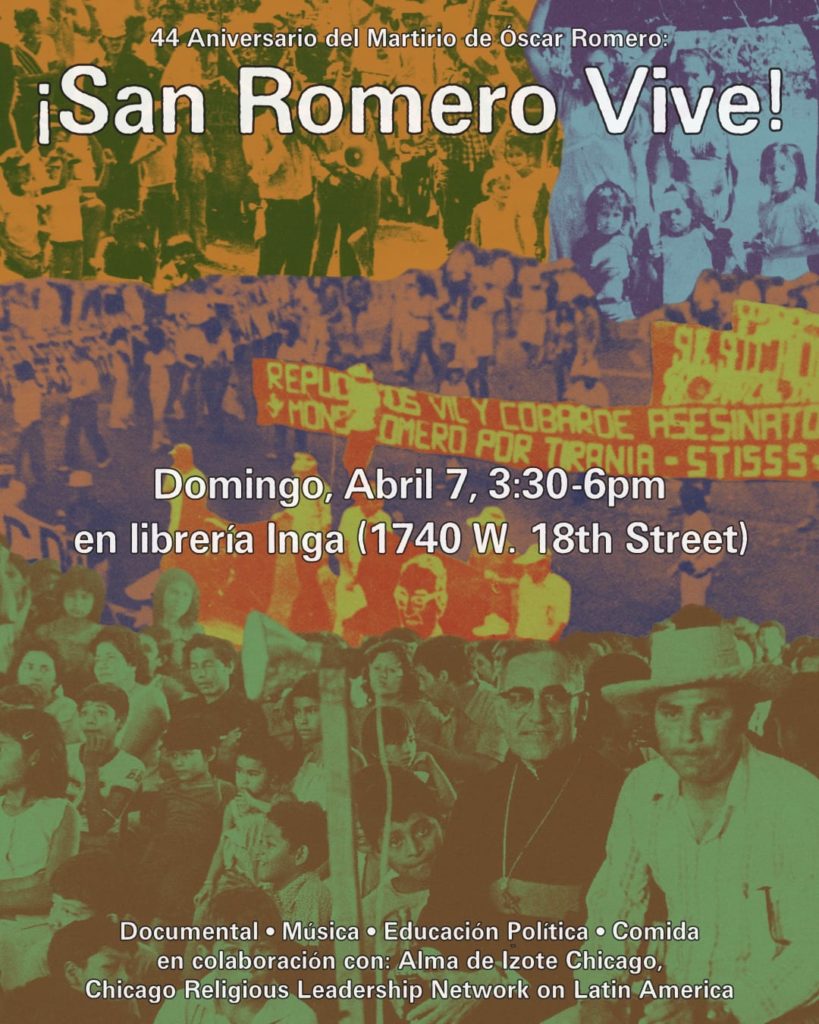Óscar Romero Commemoration Event
Sunday, April 7, from 3:30 to 6:00pm
Inga Bookstore (Pilsen neighborhood)
1740 W. 18th St., Chicago, IL 60608
Join us on Sunday, April 7th, at 3:30pm as we come together to honor the life and legacy of Saint Óscar Romero. CRLN is delighted to partner with the Alma de Izote collective (Yuca Flower) for a special commemorative event dedicated to celebrating Saint Óscar Romero’s profound impact. His enduring influence holds special significance for CRLN, evident in his portrayal within our logo. Romero’s dedication to justice serves as a guiding light for our own efforts.
This year is the 44th anniversary of his martyrdom. We would not be CRLN if we didn’t mention that he was killed during the war in El Salvador in 1980s by the infamous death squads, which were backed and funded by the U.S government. To his legacy we say ¡San Romero Vive! ¡Presente!
Alma de Izote is a newly formed solidarity group comprising individuals from the El Salvador community and allies, united in their commitment to fostering social, cultural, and political education and dialogue within the Chicago community.
The event will feature a screening of the documentary “Monseñor: The Last Journey of Óscar Romero,” followed by an insightful discussion and commentary led by esteemed Human Rights Defender from El Salvador, Neris Gonzales, Reverend Dan Dale, and other speakers. Additionally, we will have the opportunity to enjoy food from El Salvador while experiencing live music.
We warmly invite you to join us for this meaningful occasion as we pay tribute to Saint Óscar Romero and his enduring legacy of justice and liberation. We look forward to sharing this experience with you.
“When all avenues of dialogue, understanding and rationality are closed, the Church speaks of the legitimate right to insurrectionary violence.”
“And if they kill me, I will be resurrected in the Salvadoran people.”
– Óscar Arnulfo Romero
Archive
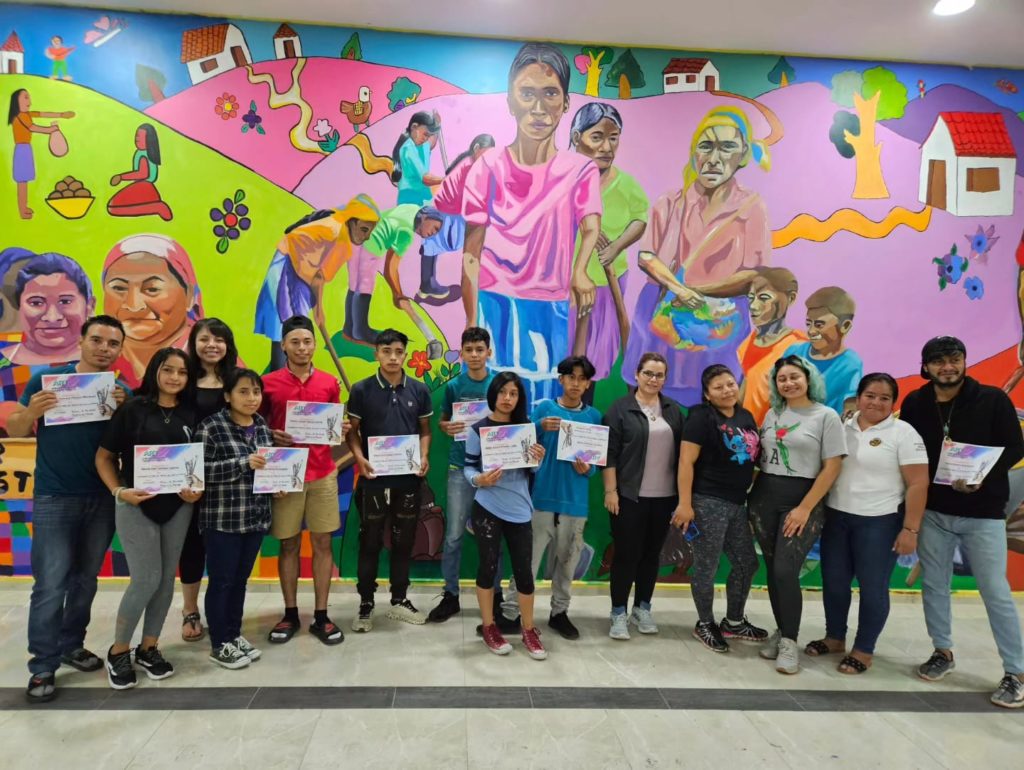
From a young age, Patricia Perez exhibited a profound interest in art, inspired by her maternal grandmother’s crafting and garment-making from hand-drawn patterns. At the tender age of nine, she delved into oil painting on canvas by observing re-runs of Bill Alexander’s “The Joy of Oil Painting” on PBS. Her artistic journey led her to study at The School of the Art Institute of Chicago and complete her art degree at Northeastern Illinois University, where she also pursued a minor in Latino and Latin American Studies, an influential element in her artistic expression.
During her time at NEIU, Patricia discovered her passion for sharing the creative process with communities, offering visual arts classes, and engaging with everyday people. Hailing from the Guatemala and Puerto Rico diaspora, she has been a dedicated mentor and educator, empowering students and establishing platforms for exploring identity and social justice issues in Chicago.
While her connection with CRLN is recent, her impact has been remarkable. In May 2023, she led a collaborative mural project commemorating the people who were martyrs and disappeared during Guatemala’s Internal Armed Conflict. Presenting the mural at a special event, she honored their memory and stories. Subsequently, in October, Patricia co-led a pilot mural initiative with Red COMAL, one of our partner organizations in Honduras. This project initiated with online Zoom classes focusing on color theory and history, culminating in her journey to Siguatepeque, Honduras. There, she provided support and collaborated with community members and youth from Red COMAL, shedding light on historical injustices and uplifting the work of people in the community and the work of Red COMAL over the last 30 years. This pilot program is very special because we are celebrating with Red COMAL 30 years of work in Honduras through the transformative power of art.
Presently, Patricia is engrossed in her upcoming painting series, drawing inspiration from the stories of migrant children and their families.
It is Raining, Let’s Relocate Indoors
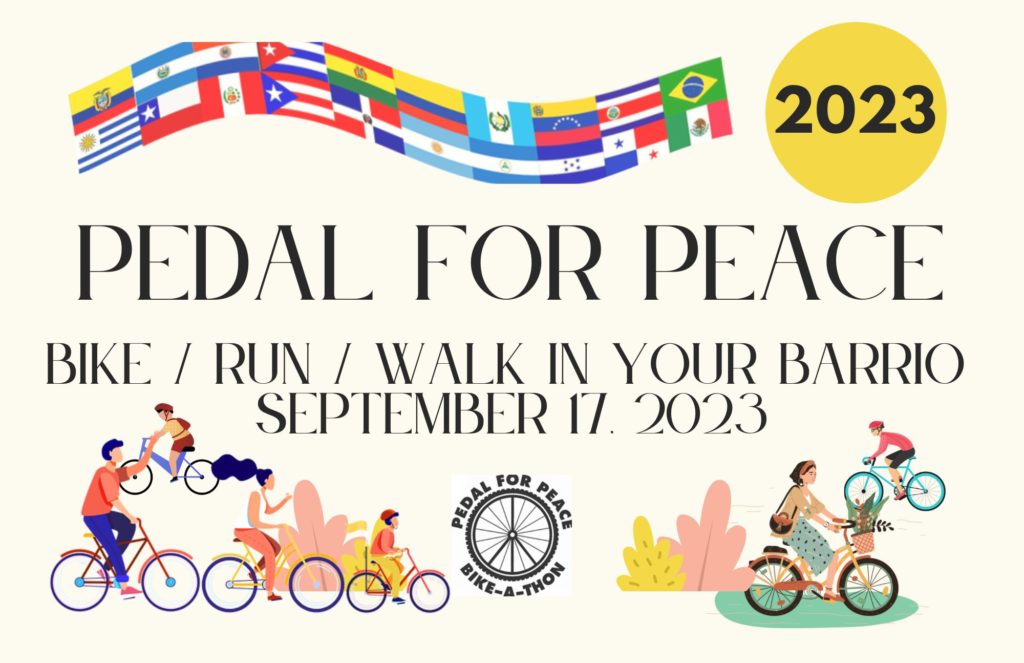
Dear friends of CRLN,
Thank you to all of you who have already donated to Pedal for Peace 2023. If you haven’t done so already, we kindly invite you to make a donation by clicking the “Donate Now to Pedal for Peace 2023” button above or by clicking here.
The Weather Service forecasts rain for tomorrow. If that happens our ¨IN CASE OF RAIN PLAN¨ is to gather at Centro Romero (6216 N Clark St) at 11am instead, which is about 4 blocks away from the park. Someone will be at the park to meet people and support those who did not see this email. Please let people know if you can.
If we don’t see rain, our plan is the same, meet at 11am, on Sunday, September 17, at Emmerson (Louis) Park (1820 W Granville Ave.) Those who can will ride their bikes, walk and run with us that day. The event will be two hours of biking, running, walking, and communal celebration. We have a brief program planned, which will start at 11am and wrap up around 1 pm. Following this, we will migrate a few blocks to Centro Romero (6216 N Clark St.) for refreshments, poetry readings, and to continue celebrating our friendship and solidarity.
On behalf of Centro Romero, Chicago-Cinquera Sister Cities, Chicago-Guatemala Partnership, and Concern America – we thank you and are looking forward to a celebration of friendship and solidarity.
If you have any questions, please don’t hesitate to reach out to me at jgomez@crln.org.
En solidaridad y resistencia permanente,
Jhonathan F. Gómez

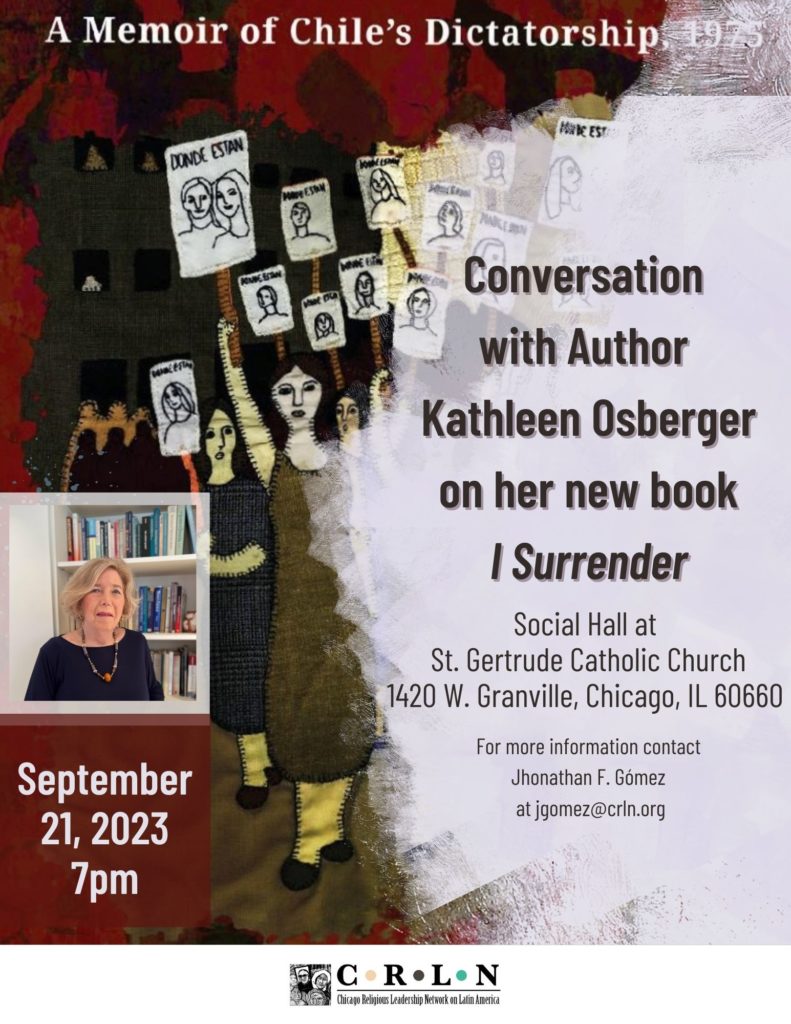
Join us for a Special Event with
Author Kathy Osberger
Kathleen Osberger has been a steadfast supporter and friend of CRLN for many years. Kathy is not only a dedicated human rights defender and activist but also a licensed clinical social worker and psychotherapist who has provided crucial support to the human rights community in Chicago, particularly by offering care and counseling to trauma and torture survivors.
We invite you to join us on Thursday, September 21, at 7 pm at St. Gertrude Catholic Church in Chicago as we celebrate the launch of Kathy’s new memoir, “I Surrender.”
Kathy’s memoir is a powerful testimony to her experiences in Chile. In September of 1973, a coup d’état, with the backing of the United States, toppled the democratically elected socialist government of Salvador Allende. Kathy arrived in Chile in 1975, during the early years of the dictatorship. Upon her arrival, she was entrusted with a secret: the religious women she would be living with were providing refuge to dissidents targeted by Pinochet’s secret police. “I Surrender” vividly portrays the solidarity of the Chilean people and the transformative role played by nuns and priests dedicated to serving the poor, while highlighting the changing and challenged Catholic Church.
Books will be sold at the event. And if you cannot make it on September 21, we recommend you watch an interview where Kathy shares some of her ideas and feelings behind her book. Click here or below to see the interview.
If you have any questions, please don’t hesitate to reach out to me at jgomez@crln.org.
En solidaridad y resistencia permanente,
Jhonathan F. Gómez

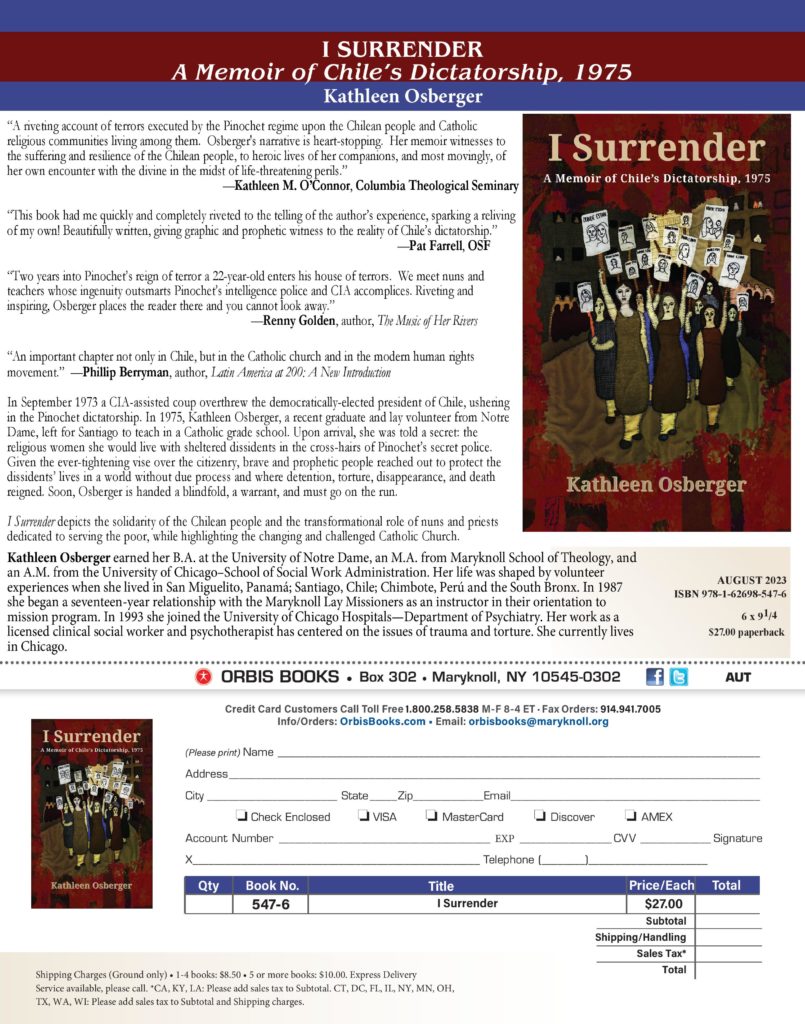
Join us for a Condensed / Smaller
Pedal for Peace 2023 Celebration

(You can download our flyers below)
As we approach the end of summer, CRLN enters a period of transition. Change can be both positive and necessary, but what remains unchanged is CRLN’s unwavering commitment to the liberation of the people of Latin America. Our work persists, it is part of our collective resistance and is driven by solidarity and our actions.
This year, the Pedal for Peace project will take on a more condensed format compared to previous years. Rest assured, we’ll still be bikes, as well as walking and running in our barrios. While it may not be as elaborate as before, our partner organizations – Centro Romero, Chicago-Cinquera Sister Cities, Chicago-Guatemala Partnership, and Concern America – are looking forward to a celebration of friendship and solidarity. And yes, we will continue to raise funds for our ongoing projects.
We kindly invite you to make a donation by clicking here.
Join us on Sunday, September 17, at 11 am on the north side of Chicago, at Emmerson (Louis) Park (1820 W Granville Ave.). The event will be two hours of biking, running, walking, and communal celebration. We have a brief program planned, which will start at 11am and wrap up around 1 pm. Following this, we will migrate a few blocks to Centro Romero (6216 N Clark St.) for refreshments, poetry readings, and to continue celebrating our friendship and solidarity.
If you have any questions, please don’t hesitate to reach out to me at jgomez@crln.org.
En solidaridad y resistencia permanente,
Jhonathan F. Gómez


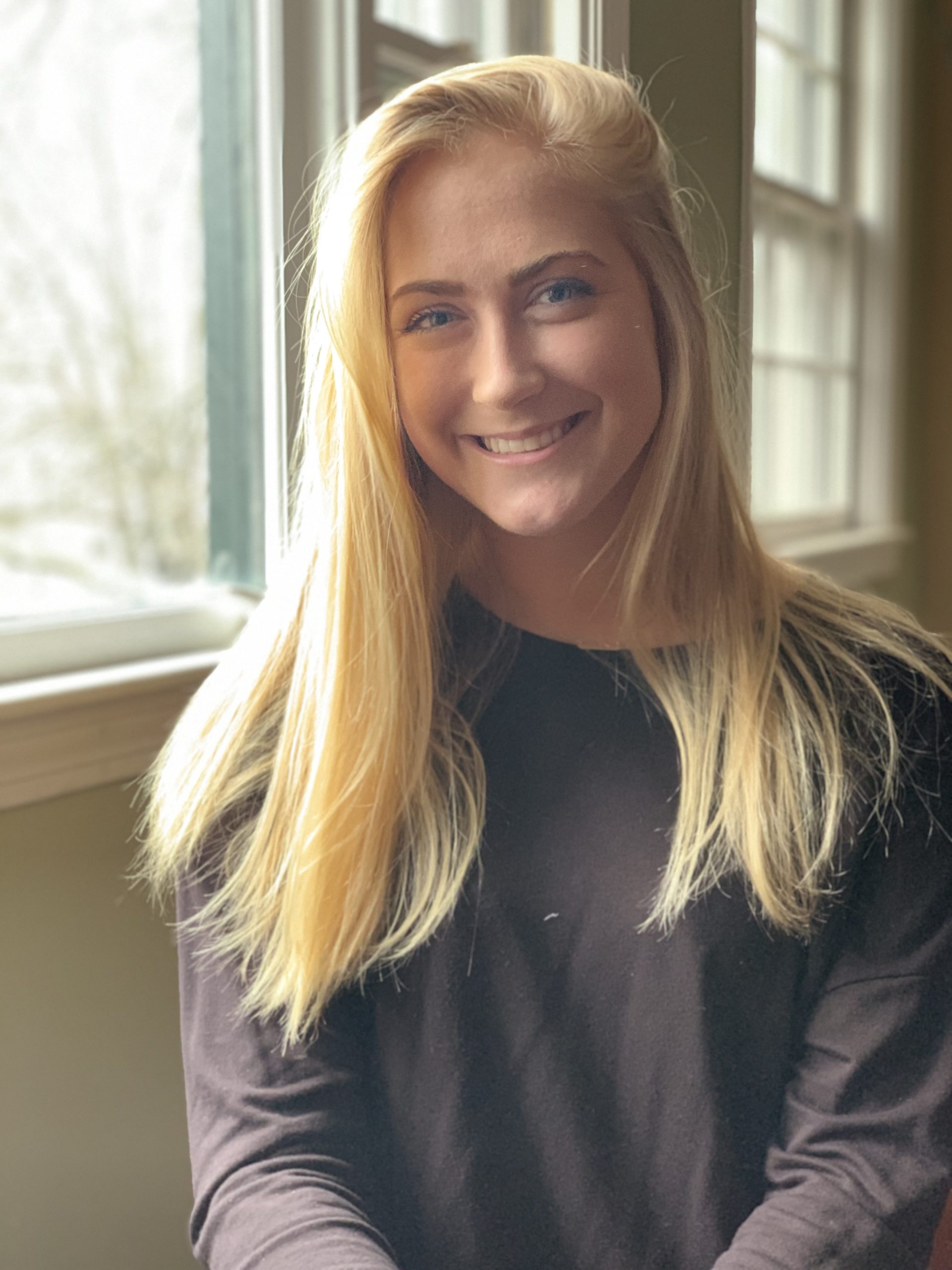
Hope Vaughn
Case Manager
Hope Vaughn is a Connecticut local who’s been advocating and organizing in Chicago for the past 3 years. Hope has her BSW, MSW, and LSW in the state of IL. Hope is passionate about international social work, immigration justice, and community collaboration. Hope has been organizing with various agencies throughout her time in Chicago. Hope’s involvement with Westside Mutual Aid has aided families and seniors in their obtainment of nourishing food throughout the West Side of Chicago. Her continued support through Chicago Community Jail Support has increased resources and volunteer attainment throughout the movement. Hope has experience in studying and living abroad in Spain, Dominican Republic, and Chile. Her Spanish speaking abilities are an asset to the Sanctuary Working Groups Team. Hope is passionate about spirituality, social justice, and community. She strives to live out radical values as did Dorothy Day, a big lifetime influence of hers.
Contact Information
(331) 465-1161
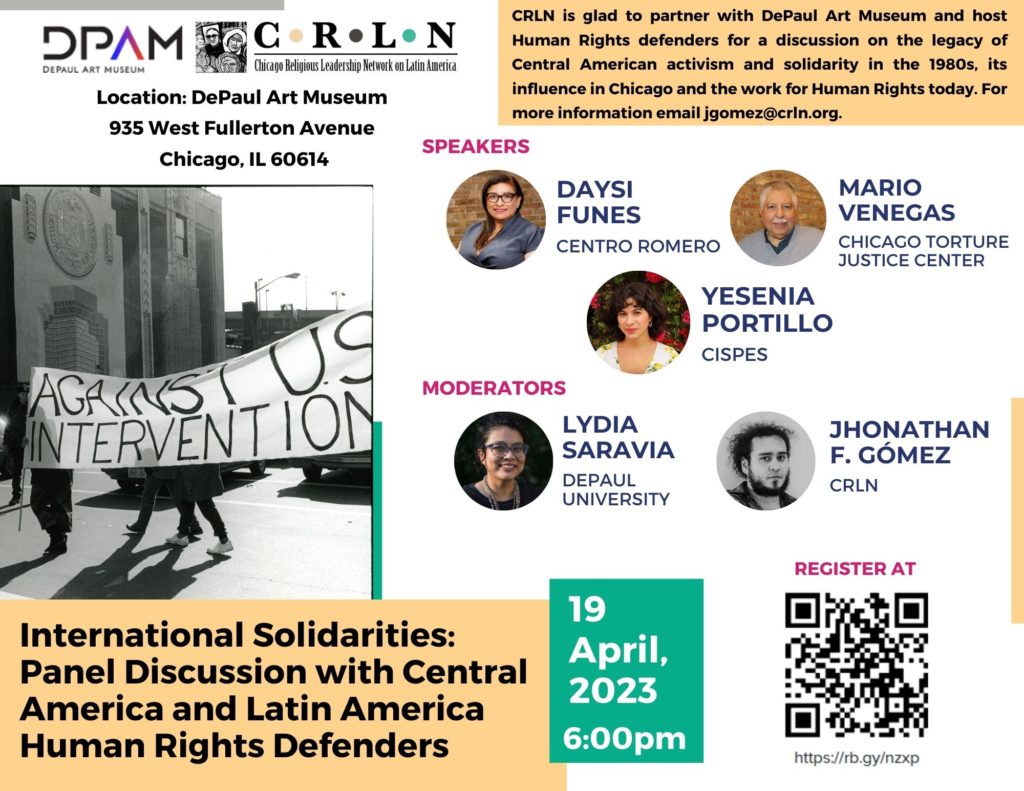
CRLN is glad to announce a special event in partnership DePaul Art Museum and host Human Rights defenders for a discussion on the legacy of Central American activism and solidarity in the 1980s, its influence in Chicago and the work for Human Rights today. International Solidarities: Panel with Current Central American Humanitarian Defenders will happen on Wednesday, April 19 at 6pm at the DePaul Art Museum. Our dear colleagues Daysi Funes, Co-founder and Chief Executive Officer of Centro Romero, Yesenia Portillo from CISPES (Committee in Solidarity with the People of El Salvador) and Mario Venegas, a Human Rights defender from Chile with the Chicago Torture Justice Center and a torture survivor himself will participate in the panel. The event will be co-moderated by Lydia Saravia, faculty at DePaul University, both Lydia and Mario are CRLN board members and will add their unique experiences and thoughts to the event. Jhonathan F. Gómez, Latin America Program Coordinator will co-moderate the event. This event is directly related and a way for the people of Chicago to respond to the art exhibit ART FOR THE FUTURE: ARTISTS CALL AND CENTRAL AMERICAN SOLIDARITIES, which opened at the museum on March 23 and will be remain there until August 6, 2023. The exhibit “¨¨¨focuses on the seminal 1980s activist campaign, Artists Call Against US Intervention in Central America. Growing out of the friendships, solidarity networks, and political organizing amongst artists and activists such as Daniel Flores y Ascencio, Lucy Lippard, Doug Ashford, Leon Golub, and Coosje van Bruggen”.
This event is also presented in partnership with DePaul University’s Center for Latino Research and the Department of Writing, Rhetoric, and Discourse.
‣ Please register here.
‣ Additional information here.
Contact Jhonathan F. Gómez at jgomez@crln.org to learn more.
We also recommend this video by PBS NewsHour on the exhibit
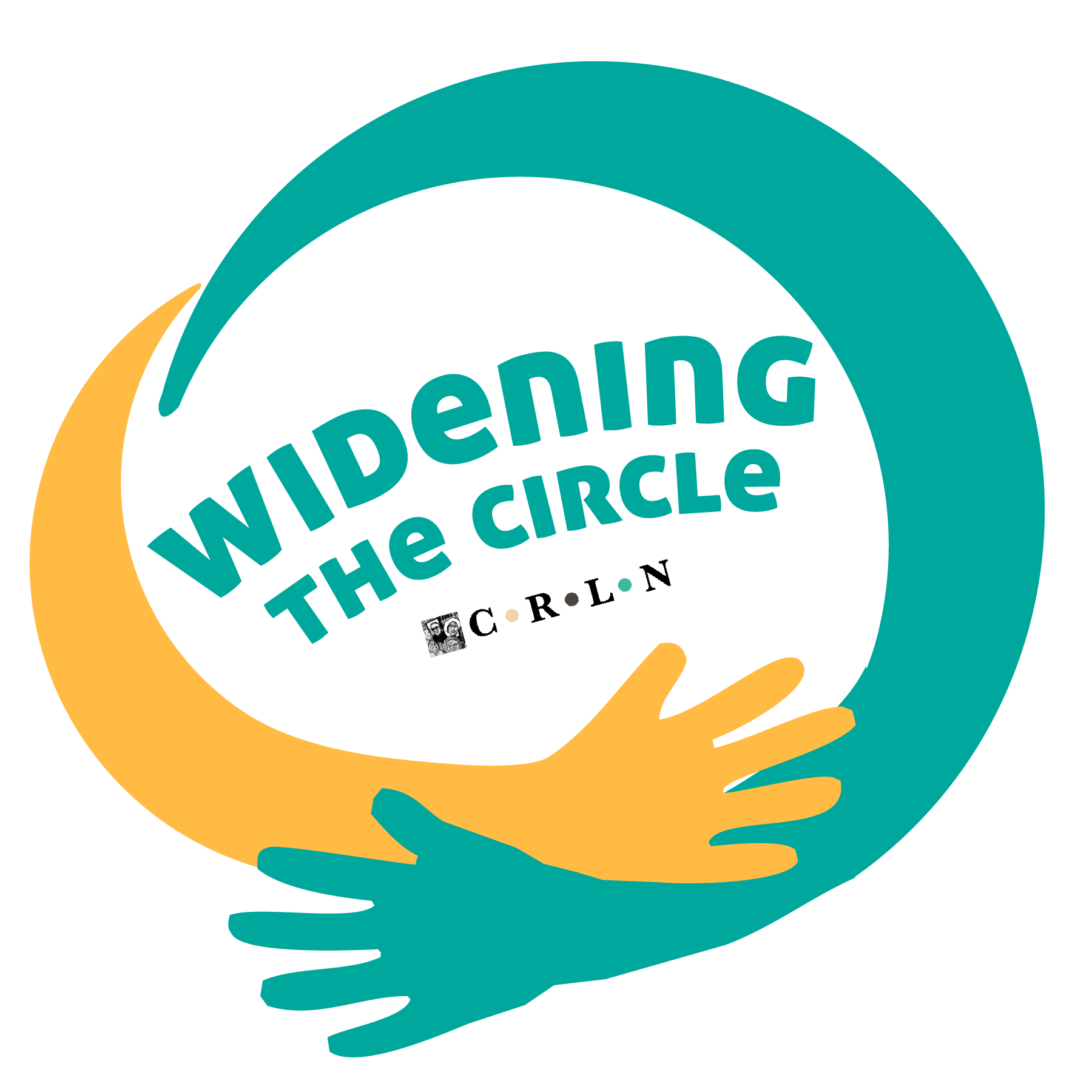
This resource guide is a helpful introduction to passionate faith communities, organizations, and community members interested in providing temporary housing (3 months to over one year) to our asylum-seeking neighbors. Providing a safe and welcoming place for asylum seekers to call home for a while is a beautiful way to put our faith and belief in humanity into action – to love our neighbors as ourselves. It is also a powerful expression of solidarity amidst a complicated, and often unjust immigration system.
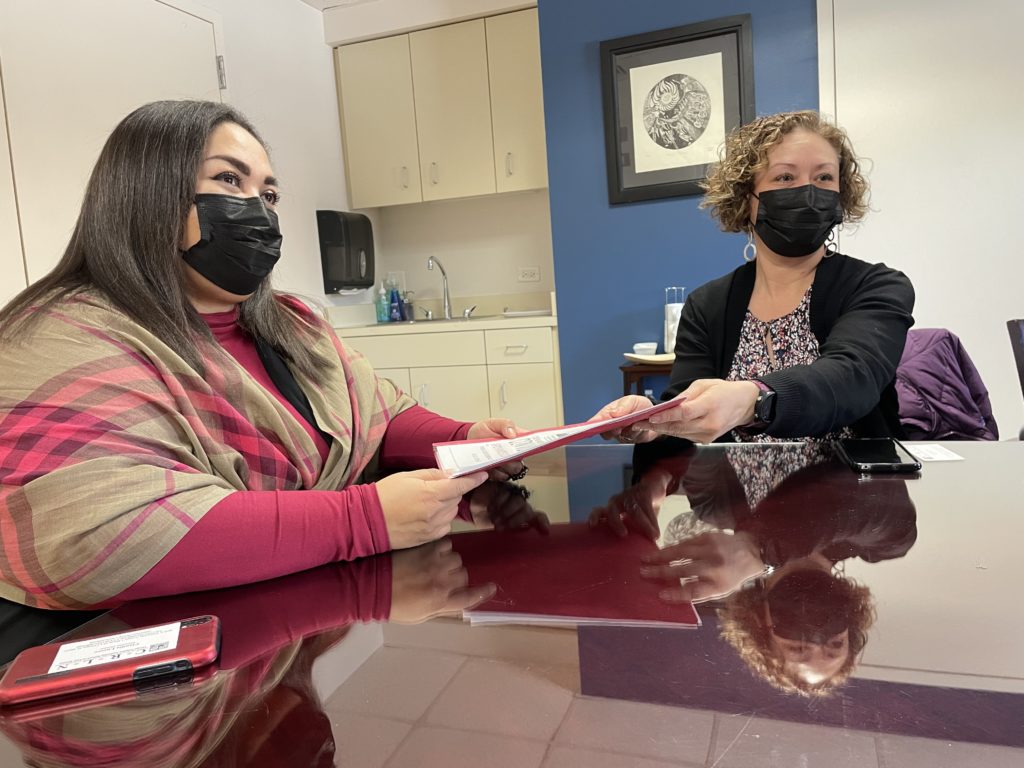
CRLN joins Alianza Americas & their 50+ member organizations in demanding that the authorities of #Michoacán and #Colima take all necessary actions to locate #humanrights defenders, Ricardo Arturo Lagunes Gasca, a lawyer, and Antonio Díaz Valencia, leader of the Indigenous community of Aquila, #Mexico. State officials must guarantee protections for people defending ethnic territory and the environment.
Read our full letter here
Join us by signing the petition
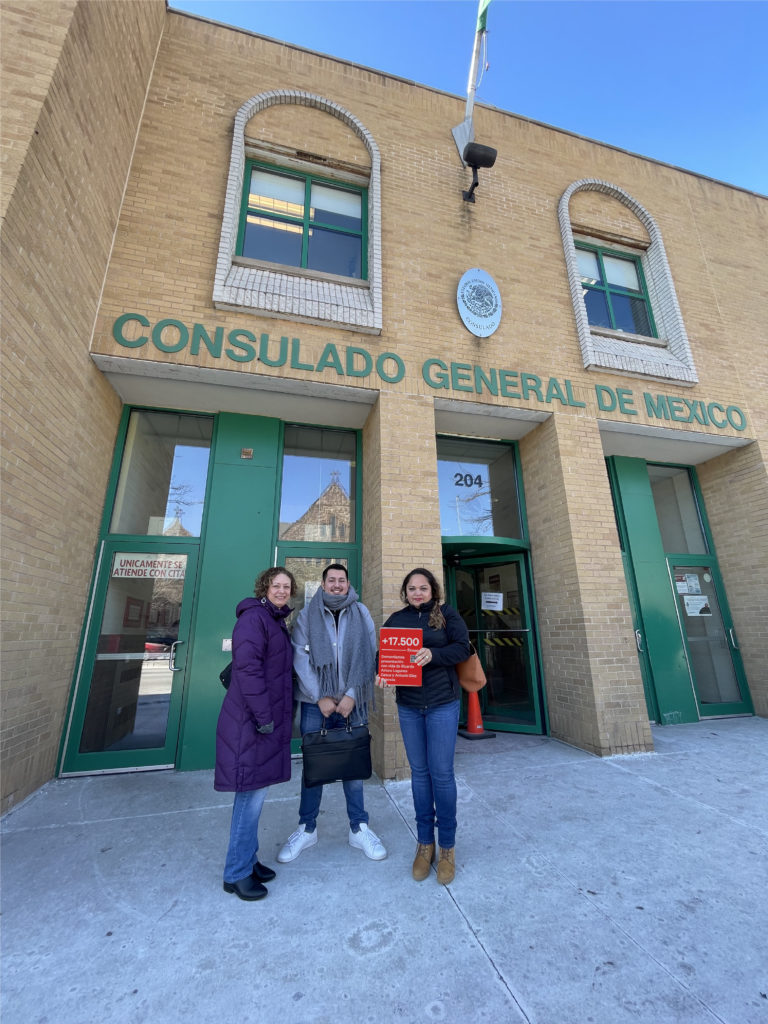

Chicago Il a 01 de febrero de 2023
Embajadora Reyna Torres Mendívil
Cónsul General de México en Chicago
PRESENTE
Apreciable Embajadora
Alianza Americas, es una red conformada por 56 organizaciones de la sociedad civil dirigidas por personas inmigrantes latinoamericanas y caribeñas radicadas en Estados Unidos de América, nos dirigimos a usted con la finalidad de que, a través suyo, haga llegar nuestra preocupación al presidente de México, Andrés Manuel López Obrados, sobre la desaparición de los defensores de derechos humanos, el profesor Antonio Díaz Valencia y el abogado Ricardo Arturo Lagunes Gasca. Sabemos que ambos han sido víctimas de secuestro y desaparición forzada, hecho que se perpetró cuando los dos se trasladaban al Estado de Colima, después de haber salido de una asamblea comunitaria que se realizó en el auditorio comunal del municipio de Aquila, en el Estado de Michoacán.
La última vez que sus familias tuvieron contacto con ellos fue el pasado domingo 15 de enero a las 18:50. Posteriormente, la camioneta en la que se trasladaban, fue encontrada en la carretera federal conocida como zona de topes de Cerro de Ortega, municipio de Tecomán, estado de Colima, presentando impactos de bala, sin que ellos fueran localizados al interior ni a los alrededores, por lo que se presume que tanto el profesor Valencia como el abogado Ricardo Lagunes fueron privados de su libertad por desconocidos, situación que pone en grave riesgo su integridad física y psíquica y su vida.Tenemos conocimiento de que, en dicha asamblea, entre otras cosas, se abordaron temas relacionados a la operación de la mina de hierro Las Encinas, propiedad de la empresa transnacional Ternium. De acuerdo con información de la comunidad, desde marzo de 2012 la empresa ha incumplido con los compromisos económicos y sociales asumidos con los 465 comuneros, incluyendo un acuerdo del pago de regalías por la extracción del mineral.[1] Además, tenemos conocimiento que hasta el momento, la comunidad de Aquila, no cuenta con representación comunitaria elegida democráticamente y que, de acuerdo con información de la comunidad, estaba previsto que las elecciones ejidales se realizarán en el mes de febrero y que Antonio Díaz es un fuerte candidato para ganar la representación.
[1] Aquila: autoridades acusan a minera Ternium de incumplir compromisos.
Cabe señalar que la mina es un actor económico y político que tiene mucho poder en la región y que, de acuerdo con información de la propia Comisión Nacional de Derechos Humanos (CNDH), se presume que la presencia de la mina ha generado graves divisiones entre la comunidad.[1]
En este sentido, desde hace aproximadamente cuatro años, Ricardo Arturo Lagunes Gasca, fundador de Asesoría y Defensa legal del Sureste, se encuentra acompañando legalmente a la comunidad para obligar a la empresa a cumplir con lo convenido, mientras que Antonio Díaz Valencia, como líder comunitario, acompañaba a Ricardo en el proceso de documentación y en el establecimiento de diálogo con la comunidad para que tuvieran conocimiento de las estrategias legales a seguir.
Esta situación es para nosotros de suma gravedad sobre todo porque su desaparición se da en un contexto en el que distintas personas defensoras del territorio y del medio ambiente han sido
víctimas de delitos y amenazas a sus vidas.[2] En los últimos 3 años, más de 50 personas han sido asesinadas,[3]además de que se han documentado diversas agresiones como intimidación,
hostigamiento, amenazas y agresiones físicas contra otras personas. Además, es conocido que parte de la estrategia que han implementado las empresas mineras para continuar con la explotación de minerales, consiste en incumplir sus compromisos en perjuicio de la comunidad que comúnmente termina dividida.[4] Asimismo, se ha documentado que es frecuente que estas empresas realicen acuerdos con grupos de delincuencia organizada con el fin de sembrar temor y desarticular los procesos de exigencia y defensa de los derechos comunitarios.
Desde nuestras organizaciones tenemos conocimiento de que las familias de Ricardo y Antonio, así como diversas organizaciones defensoras de derechos humanos, han implementado diferentes acciones de denuncia, logrando incluso que, el Comité contra la Desaparición Forzada de Naciones Unidas, expidiera una acción urgente al gobierno de México para que implemente una estrategia articulada de búsqueda de Ricardo y Antonio de la cual sus familias deben ser parte y deben estar notificadas de todos los avances.
Por lo anterior, es que nos dirigimos a usted para que haga llegar nuestro llamado urgente al presidente de México para que se realicen las siguientes acciones:
1. Que en cumplimiento con las medidas cautelares emitida por el Comité contra la Desaparición forzada, la Fiscalía General de la República (FGR) realice las investigaciones correspondientes para dar con los responsables de la desaparición de Ricardo Arturo Lagunes Gasca y el profesor Antonio Díaz Valencia, agotando todas las líneas de investigación incluidas las que puedan estar relacionadas con la conflictividad generada en la zona por la presencia de la empresa minera Ternium.
2. En consecuencia, haga un llamado urgente para que las fiscalías generales en los Estado de Colima y de Michoacán, realicen las acciones de investigación correspondiente en articulación con las líneas de investigación identificadas por la FGR.
3. En el mismo sentido, se verifique que la Comisión Nacional de Búsqueda (CNB) realice todas las acciones necesarias para localizar con vida a Ricardo Arturo Lagunes Gasca y al profesor Antonio Díaz Valencia, fortaleciendo sus estrategias en conjunto con las Comisiones estatales de búsqueda de los Estados de Colima y Michoacán.
4. Solicite al gobernador de Michoacán y a la gobernadora de Colima, brinden toda la información de contexto sobre violencia y presencia de grupos de delincuencia organizada que operan en sus estados para facilitar las investigaciones penales que se están realizando y que, asimismo, realicen todas las acciones de seguimiento para verificar que tanto las fiscalías como las comisiones de búsqueda, colaboren y participen activamente en la investigación y acciones de búsqueda en coordinación con sus homólogas a nivel federal.
5. En particular, pida al gobernador de Michoacán que solicite al Presidente municipal de Aquila que proporcione toda la información de contexto y de presencia de grupos de delincuencia organizada que operen en el municipio y sus alrededores, con el fin de acercar la mayor información posible que permita a las FGR construir y fortalecer sus líneas de investigación.
6. Se garantice la integridad y seguridad de las familias de Ricardo y Antonio, así como de la comunidad de Aquila que se encuentra realizando actos de protesta tanto en carreteras como en las instalaciones de la minera.
Agradecemos de antemano su comprensión y la facilitación para que nuestras preocupaciones lleguen a manos del señor presidente, Andrés Manuel López Obrador.
Atentamente,
Claudia Lucero Durango Unido en Chicago
Yolanda Avila Colectivo de Mujeres Trasnacionales
Hayde González Cambiando Vidas
Giselle Rodríguez Center for Immigrant progress
Angela Zambrano Red de líderes y organizaciones de migrantes en EEUU (RedMx)
[1] CNDH. Informe especial sobre los grupos de autodefensa en el Estado de Michoacán y las violaciones a los derechos humanos relacionadas con el conflicto. 2016. Disponible en https://www.cndh.org.mx/sites/all/doc/Informes/Especiales/2016_IE_gruposautodefensa.pdf
[2] Desaparecen a activista contra mina en Guerrero.
[3] México: 58 defensores de ambiente y territorio fueron asesinados en los últimos tres años.
[4] La minería, transformación
necesaria.https://contralinea.com.mx/opinion/la-mineria-transformacion-necesaria/

